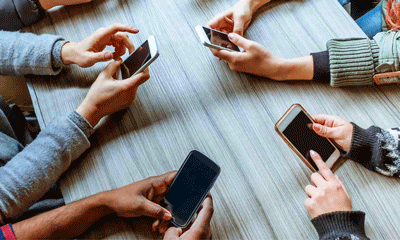A recent trip to Europe showed the author that smartphone addiction may be a peculiarly American malady.
_________________________
By Mat Tombers
On December 2, The New York Times printed an article by Tim Herrera, “Hide Your Phone When You’re Trying to Work. Seriously.” Immediately, I clipped it to the notebook on my phone for later reading.
 When I did read it, I saw the wisdom in what Herrera was saying. As helpful as they are as productivity tools, smartphones are also chronic distractions. I’m constantly checking mine to see what new emails and texts have come in, to see what’s the “natter” in my digital universe.
When I did read it, I saw the wisdom in what Herrera was saying. As helpful as they are as productivity tools, smartphones are also chronic distractions. I’m constantly checking mine to see what new emails and texts have come in, to see what’s the “natter” in my digital universe.
The article also caused me to think about how the smartphone’s presence in our lives alters not just our productivity but our ability to be present in the moment. A recent vacation primed me to see this.
What I am describing is anecdotal, not scientific.
Last fall, gifted with a space of available time not seen since the summer between my first and second year of teaching, I armed myself with a Eurail Pass and purchased a one-way ticket to Paris with my return on the November 4 crossing of the Queen Mary 2.
All I had was an in and out date: the rest was a blank piece of paper.
Having previously spent a fair amount of time in Paris and London, I set out for smaller places. In Verdun I visited the World War I battle museum and Ossuary, discovering the value of my translation apps when navigating a foreign country.
In Verdun, I began to notice differences between how I used my smartphone and how the French used theirs. While waiting with a Frenchman at the taxi stand at Verdun, I fiddled with my phone. His sat beside him while he read a book.
At dinner that night, the only people other than me who were playing with their phones were a mother, daughter and granddaughter. They were from Michigan.
Sitting in restaurants in St. Malo, I saw it again. The French were conversing; Americans curled over smartphones. The wait staff didn’t sneak furtive phone looks while on shift; they waited until they were done, pulling them out of their pockets as they were leaving.
An American couple, about my age, looked at their phones, occasionally chatting with each other while eating lunch. A French couple, also about our age, sat at their table, laughing, and savoring their desserts and feeding each other tastes.
_________________________________________________________________________________________________
It seems, from my recent experience and observations, smartphones are barriers not just to productivity but also an impediment to that thing our gurus tell us to follow, mindfulness. Ironically, to see the extent of the impediment in America I had to go to Europe.
_________________________________________________________________________________________________
In the morning, walking from my hotel, I would pass restaurant after restaurant where people talked and their phones were nowhere to be seen. If patrons were dining alone, they’d read—can you believe it?—real, printed newspapers?
It was the same in Cologne. It was the same in Heidelberg, where – after finishing the English tour of the Castle – my fellow Americans whipped out their phones, one and all, to check their messages.
Wiesbaden was no different. Phones were tools, not appendages, and certainly not obsessions.
On a one-night stopover in Paris on my way to England, a group of American friends and I went out to dinner. I watched, with amusement, as all huddled over their phones, checking them, re-checking them, putting them down, and then picking them back up to check again.
Not so the French patrons of the restaurant.
By this time, I was working to be more aware of not being glued to my phone and to emulate the Europeans around me, to stay more in the moment, to stay with the people around me.
A week in Cornwall underscored my French and German experiences.
Finally, my phone detox continued when I sailed home on the Queen Mary 2. Phone connectivity was prohibitively expensive, and so I only used my iPhone as a camera.
It seems, from my recent experience and observations, smartphones are barriers not just to productivity but also an impediment to that thing our gurus tell us to follow, mindfulness.
Ironically, to see the extent of the impediment in America I had to go to Europe.
And, perhaps not so ironically, since coming back to the States I have had to work hard not to be swept up with my friends and colleagues as they all pull out their phones. It takes an act of will to keep my phone in my pocket and off the table. I am better, but still far from perfect.
The proximity of a mobile device is a siren’s song that is hard not to hear.
__________
Mathew Tombers is a media strategist, consultant, and a senior fellow at the Center.
See all columns from the Center.
January 10, 2018

